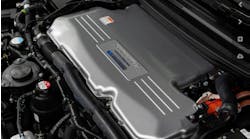But, as is the case with any alternative or emerging solution being positioned against a long-established practice (in this case gasoline or diesel), there are still a lot of myths in the marketplace regarding the use of propane autogas.
The following are the most common myths associated with propane autogas:
Myth No. 1: Propane autogas doesn’t make sense with current oil prices so low. Propane autogas vehicles provide the lowest total cost of ownership over the life of a vehicle when compared with traditional fuels. First, it’s important to remember that propane autogas is a by-product of petroleum processing.
That means when oil prices decline propane autogas prices decline too. Fleet managers can be further insulated from oil market price fluctuations by establishing a long-term fuel contract with a propane autogas retailer. If gasoline or diesel prices return to the range of $3 or $4 per gallon seen just a couple of years ago, the contracted price will ensure propane autogas costs remain low. Federal and state incentives are also available to lower the price paid per gallon for propane autogas. For example, qualifying fleets can take advantage of the $0.36 federal excise tax credit for each gallon of propane autogas used in 2016, further reducing a contractor’s overall fuel costs.
Fuel savings are only one of the major benefits of propane autogas — even greater benefits and savings are available when you look beyond the price at the pump. Propane autogas eliminates the additional costs, which are required with today’s diesel emissions technology: fluids, filters, excessive maintenance requirements and unexpected repairs. So even when conventional fuel prices are low, propane autogas continues to provide substantial savings for fleet managers.
Propane autogas engines require less maintenance than their diesel counterparts, which equates to decreased downtime for repairs, increased uptime and productivity, increased customer satisfaction and increased profits for fleets of all types. Simply stated: Propane autogas vehicles spend less time in the shop and more time on the route, serving customers.
Myth No. 2: Propane autogas is inaccessible. In reality, propane autogas is domestic, affordable, sustainable and accessible. Propane autogas is as portable and accessible as gasoline or diesel and is available from propane retailers located throughout the U.S. Maybe there’s a propane retailer in your backyard. Fleets can choose from affordable and flexible refueling options, which include temporary on site refueling, mobile refueling and private on-site refueling infrastructure for small and large operations alike. Public refueling networks are available throughout the U.S. and may be an option for fleets.
A propane autogas retailer can assist a contractor in choosing a refueling solution based on the fleet’s needs, which include the business location, budget and available facility space. The Propane Education & Research Council makes it easy to find a local propane partner with its Find a Propane Retailer tool online at propane.com.
For vehicle fleets that travel beyond the driving range of a single tank fill, certified aftermarket bi-fuel systems are available, which allows the driver to choose either propane autogas or gasoline as the primary fuel for operation. This freedom of choice has proven to eliminate “range anxiety,” the overwhelming concern that a vehicle may not be able to find a propane autogas refueling station or return to base before running out of fuel.
Myth No. 3: Purchasing alternative fuel vehicles is too expensive. Yes, the initial purchase price of a dedicated propane-autogas-powered vehicle is slightly higher than a comparable gasoline or diesel model. However, the total cost-of-ownership is significantly less when the total cost structure over the lifespan of the truck or van is considered and analyzed. When a fleet analysis of the ownership, operation, maintenance, overhead and downtime costs is done, propane autogas costs less per mile to operate than any conventional or alternative fuel available today.
Contractors also have the option to convert existing fleet vehicles to propane autogas with a growing number of EPA and CARB certified aftermarket fuel systems available in the market today. Aftermarket certified systems include dedicated as well as the lower cost bi-fuel systems, which use propane autogas as the primary fuel on board and gasoline as the secondary fuel.
Depending on their location, contractors should investigate the availability of state or local grants or incentives for propane autogas vehicles. Complete information regarding available federal and state incentives can be located on the Alternative Fuels Data center website at www.afdc.energy.gov. An additional resource, Clean Cities Organizations has proven to be a very valuable consultative partner for fleets interested in transitioning to propane autogas. Federal and state contact information for Clean Cities organizations can be found at www.afdc.energy.gov/uploads/publication/clean_cities_contacts.pdf.
Myth No. 4: Refueling alternative fuel vehicles is a pain: Refueling with propane autogas is simple, quick, safe and similar to the conventional refueling experience. Staubli and Elaflex refueling nozzles are lightweight, capable of one hand operation, and provide a secure lock during refueling, which eliminates concerns about evaporative emissions or fuel spills. Like conventional fuels, propane autogas is dispensed at equivalent gallons per minute rates, which ensure there’s no increase in employee refueling times. Another benefit of the fuel, drivers are quick to point out that they do not smell like gasoline or diesel while on their route during the day or returning home at the end of the day.
Advances in refueling technology and constant product improvement campaigns provide the customer with state of the art technology, which makes refueling with propane autogas fast, safe and convenient.
Myth No. 5: Propane autogas isn’t a safe fuel. Propane autogas has been safely deployed without a single catastrophic event in fleets since the 1970s. Schwan’s Foods is an innovator and early adopter of propane autogas and continues to deploy propane autogas in more than 70 percent of its fleet vehicles. Another early adopter, Portland Public Schools has deployed hundreds of propane autogas school buses in their fleet and safely transported students to school and home safely every day with propane autogas for over three decades.
Propane autogas fuel systems are pressurized, which means the fuel is stored in pressurized fuel tanks. Propane autogas fuel tanks are 20 times more puncture resistant than today’s gasoline fuel tanks and each fuel system is equipped with built in safety devices, which will stop the flow of fuel in the event of a catastrophe, even when the ignition switch is in the on position. Propane fuel systems meet or exceed all Federal Motor Vehicle Safety Standards (FMVSS), which include crash worthiness and fuel conspicuity.
Unlike other alternative fuels, repair and maintenance facilities that are code compliant for diesel or gasoline vehicles maintenance and repairs is code compliant for propane autogas. Existing buildings typically do require modifications and fleets are not required to segregate major and minor repairs. It’s important to still consult with the Authorities Having Jurisdiction (AHJ) in the contractor’s location for final inspections and approvals.
Myth No. 6: Propane autogas isn’t that much better for the environment. Propane in its natural state is non-toxic and a non-contaminant of air, land and water resources. Propane autogas is recognized as a clean fuel by the Environmental Protection Agency. In the unlikely event of a leak or spill, propane harmlessly dissipates into the atmosphere. Unlike gasoline, diesel, ethanol, diesel and biodiesel, which are identified as hazardous fluids and require hazmat environmental cleanup, propane autogas is clean and safe for your fleet, our children and the environment.
Michael Taylor is the director of autogas business development at the Propane Education & Research Council. For more information on PERC and propane autogas, visit propane.com.



